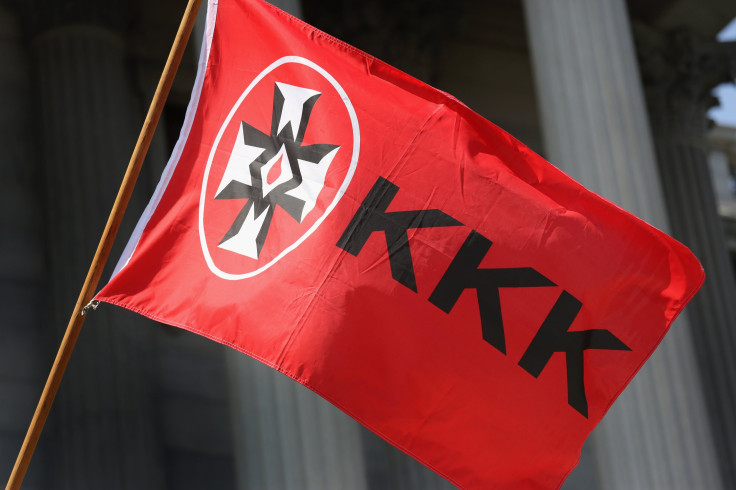David Duke, Former Ku Klux Klan Grand Wizards Say Anonymous Hackers Can't Hurt KKK Brand

David Duke, perhaps the world’s most well-known former grand wizard of the Ku Klux Klan, called this week’s release of names purported to be members of the infamous hate group an “enormous failure” because the Klan is “irrelevant these days.” He's not even remotely convinced that Anonymous -- the shadowy group of so-called “hacktivists” responsible for publishing the list -- came close to accomplishing its goal of casting shame on the KKK.
“This whole thing is sort of ridiculous,” Duke, 65, said Friday from southeastern Louisiana during a phone call following Thursday’s massive dump of contact information. "Screw Anonymous. They’ve had no impact whatsoever. There’s no KKK in the world; there are simply different groups with completely different ideologies."
The faceless online hacking collective -- which vowed to out as many as 1,000 Klan members this week -- revealed hundreds of aliases, legal names, phone numbers and email addresses of alleged card-carrying members of the white nationalist movement. While some suspected the Klan, which has been struggling to maintain a semblance of modern-day relevance, might feel a sense of prideful validation from the attention, people who have been involved with hate groups and others who monitor them said the massive revelation didn't hurt the KKK at all because white supremacists no longer rely on the Klan brand to spread its divisive ideology.
“Because of the Internet, it’s not really necessary anymore to coordinate with each other through any formal membership,” said former Klan grand wizard Don Black, whose name and phone number were included in this week's release of KKK contacts. “I don’t think it will hurt anybody. A lot of people use their real names and don’t care.”
Since the names were released, the 62-year-old Florida resident has received about a dozen hate calls, slightly more than his normal weekly volume, but that's something he said he's been dealing with for decades because he's not in hiding.
“As far as the unhooding of the Klan, I’m looking at that list and seeing this was already public information,” said Black, who runs the white nationalist online community Stormfront, a forum for hundreds of thousands of anti-Semites, homophobes and so-called race purists from around the world.
Anonymous began Thursday publishing personal details of alleged members and sympathizers of the Klan, although a separate release of names earlier in the week that identified several politicians was apparently not part of an official release. At that time, approximately 350 names were revealed in a document posted to the text-sharing website Pastebin, most of them gathered from Facebook postings of people who publicly expressed pro-white views.
OFFICIAL #OpKKK #HoodsOff 2015 Data Release.
https://t.co/EQODjs7wpA
With Love,
Anonymous
— Operation KKK (@Operation_KKK) November 5, 2015
The hacktivist group and the Klan have battled each other online over the last year, ever since Klansmen threatened Black Lives Matter protesters in suburban St. Louis, following the death of an unarmed black man who was killed by a white police officer in Ferguson, Missouri. In response, Anonymous claimed to have hacked a KKK Twitter account and shut down several websites created by white supremacy groups throughout the U.S.
Founded in 1865, the Klan has a long history of violence targeted at African-Americans, Jews, immigrants and the gay community. Mark Pitcavage, director of the Center on Extremism at the Anti-Defamation League, a Jewish civil rights group based in New York City, said the KKK is still a factor to reckon with, but it’s less of a unified brand. Thus, publishing the names of alleged Klan members and their associates didn't have an adverse effect on the group as a whole, he said.
“This wasn’t an attempt to damage the KKK’s image. It was an attempt to out these individuals personally,” Pitcavage said Friday of the Anonymous hack.
The last time the Klan received national media coverage was after officials in South Carolina permanently removed the Confederate battle flag that flew on Statehouse grounds in Columbia, the state's capital. A North Carolina chapter of the Loyal White Knights of the Ku Klux Klan staged a protest at the Statehouse in response to state lawmakers voting to remove the divisive flag after a mass shooting in June at a Charleston church that left nine black parishioners dead. [A reputed white supremacist was later indicted on hate crime and murder charges in connection with the case.]
Stephen Voss, a professor of political science who specializes in elections and race in the U.S. South at the University of Kentucky in Lexington, said publicizing the names on the list did nothing to affect white supremacists. The Klan has been relegated to a fringe of society “where it can be as stupid as it wants,” Voss said. “The risk of driving hate underground is that you can’t challenge it.”
Duke, a former Louisiana state representative who has staged multiple failing bids for other public offices, including the presidency, has been out of the Klan for 40 years, but he is still committed to the belief that white, non-Jewish Americans are victimized by multiculturalist policies. It's a belief so strongly held, by himself and others, that no one -- not even groups like Anonymous -- can diminish it simply by outing Klan sympathizers, he said.
“They didn’t take down anybody or anything,” he said.
© Copyright IBTimes 2025. All rights reserved.






















